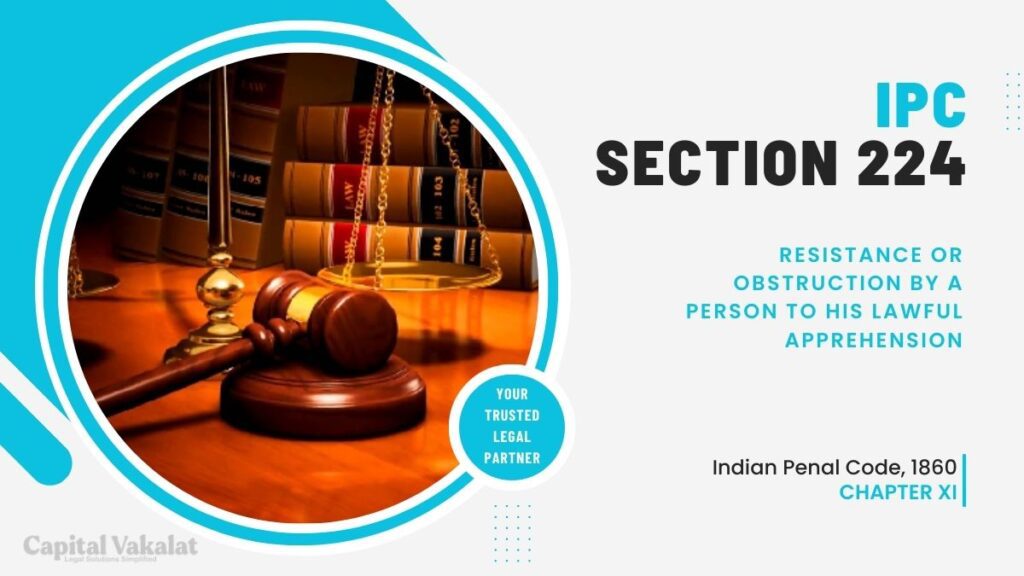Section 224 of the Indian Penal Code (IPC) is a legal provision that deals with the resistance or obstruction by a person to their lawful apprehension. This particular section is a crucial component of the Indian legal system, as it addresses the delicate balance between maintaining law and order and ensuring that the rights of individuals are upheld.

In this article, we will delve into the intricacies of Section 224 IPC, exploring its provisions, the concept of lawful apprehension, the consequences of resisting or obstructing such apprehension, judicial interpretations, and the role of law enforcement.
Understanding the Legal Provisions
Subsections and provisions within Section 224 IPC:
- Section 224 is a concise yet vital part of the Indian Penal Code. It contains the legal consequences for a person who resists or obstructs their lawful apprehension by authorities.
- This section also deals with situations where a person knowingly conceals themselves to evade arrest. Such actions have severe legal repercussions.
Lawful Apprehension and Its Significance
Defining lawful apprehension: Lawful apprehension refers to the act of arresting or taking a person into custody based on valid legal grounds. These grounds are established to maintain the rule of law and protect society from potential harm. Lawful apprehension ensures that individuals who may pose a threat to others or have committed a crime are brought to justice.
When is apprehension lawful? Lawful apprehension is only justified when it complies with legal standards, such as having a valid arrest warrant or acting in self-defense or defense of others when a crime is being committed. The law also provides for situations where immediate action is necessary to prevent harm.
Resisting or Obstructing Lawful Apprehension
What constitutes resistance or obstruction? Section 224 IPC outlines that a person who resists or obstructs their lawful apprehension can be held accountable. This resistance or obstruction can take various forms, including physically resisting arrest, hiding from authorities, or providing false information to evade capture.
Legal consequences of such actions: The legal consequences of resisting or obstructing lawful apprehension are severe and can include charges of additional offenses, such as assaulting a public servant, contempt of court, or even an attempt to escape from lawful custody. Penalties can range from fines to imprisonment, depending on the specific circumstances.
Judicial Interpretation
Landmark cases and their impact: The judicial interpretation of Section 224 IPC has played a pivotal role in shaping the legal landscape. Several landmark cases have tested the boundaries of lawful apprehension and resistance, setting precedents for future legal proceedings.
The Role of Law Enforcement
The responsibilities of law enforcement in apprehension: Law enforcement agencies are tasked with the duty of upholding the law, ensuring public safety, and bringing those who break the law to justice. The enforcement of Section 224 IPC is a crucial part of this responsibility.
Balancing the rights of the accused: Law enforcement must also respect the rights of the accused, ensuring that arrests are made with a just cause and without undue force or harassment. This balance is essential for maintaining public trust in the justice system.
Public Perception and Controversies
Public opinion on Section 224 IPC: The public perception of Section 224 IPC varies widely. Some view it as a necessary legal provision to combat crime and ensure the safety of society, while others are concerned about potential misuse by law enforcement or the infringement of individual rights.
Recent controversies and debates: Recent controversies and debates surrounding this section have centered on cases of alleged police brutality and misuse of power. These incidents have fueled discussions on the need for reform and stricter oversight.
The Importance of Safeguarding Rights
Balancing lawful apprehension with individual rights: It is crucial to strike a balance between the enforcement of Section 224 IPC and the protection of individual rights. This balance ensures that the legal system remains fair and just.
Preventing misuse of power: Efforts should be made to prevent the misuse of Section 224 IPC, ensuring that it is used for its intended purpose of maintaining law and order, rather than as a tool for harassment or abuse.
Challenges Faced by Law Enforcement
Real-life scenarios and difficulties faced by officers: Real-life scenarios can be complex, and law enforcement officers often face challenges in carrying out their duties. This includes apprehending individuals involved in organized crime, terrorism, or cases with high public interest.
Conclusion
In conclusion, Section 224 IPC serves as a critical component of the Indian legal system, ensuring that those who have committed a crime or pose a threat to society are brought to justice. However, it is equally important to uphold individual rights and prevent the misuse of this section. Striking a balance between the enforcement of this provision and safeguarding individual rights is essential for maintaining the rule of law and public trust in the justice system.
Frequently Asked Questions
Can law enforcement officers use force when apprehending a suspect?
Law enforcement officers can use reasonable force when apprehending a suspect, but it must be in proportion to the situation and comply with legal standards.
What are the penalties for resisting or obstructing lawful apprehension?
The penalties for such actions can range from fines to imprisonment, depending on the specific circumstances and applicable laws.
How can individuals safeguard their rights when confronted by law enforcement?
Individuals can safeguard their rights by remaining calm, asserting their rights, and seeking legal counsel if necessary.
Is Section 224 IPC subject to amendment or reform?
Legal provisions, including Section 224 IPC, can be subject to amendment or reform based on evolving societal needs and legal considerations. Public debate and legislative action can lead to changes in the law.